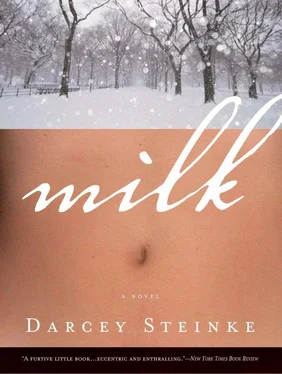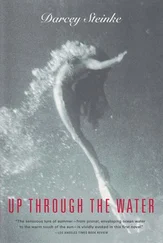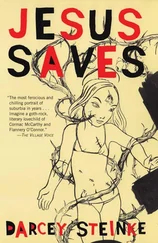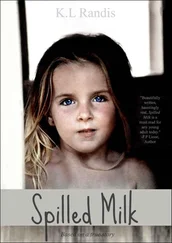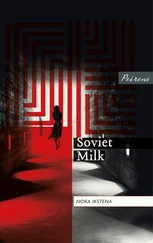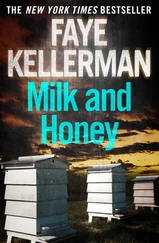He looked up and there was Mary walking down the stairs. She seemed thinner, less materially substantial, as if thousands of her atoms had disintegrated. Walter stood.
“Is his fever better?”
“I gave him a little Tylenol,” she said, taking the chair by the fireplace. Walter sat across from her on the couch. He glanced at his watch; he was having dinner with the bishop at eight.
Flitting her hands around, she talked about the renovation schedule. The painting that still needed to be done, the work she and Junot had already accomplished and what they hoped to do by working consistently through Lent.
“But that’s not what you wanted to talk about?” Walter said.
“No,” she said. “I want to ask you if you think it’s possible to break into time?”
Walter blinked. “How do you mean?”
Mary looked at him. “Let’s say a tiny animal, a squirrel or a chipmunk, had, encoded in its very DNA, in its skeleton, the equation that would stop time and bring about a Second Coming.”
Walter watched her face carefully; he tried to imagine he was watching Hildegard or Mathilde, any of the early mystics who had experienced God firsthand.
“It’s possible, right, if we find the right posture, the correct way to hold our skeleton, the door between this dimension and the next will fly open and there’ll be only the slightest difference in density between myself and my dead mother?” She paused and looked directly at him, in an effort, Walter knew, to guage his reaction.
He knew these ideas were somehow connected not only to the aleph sighting but also to her weekly visits with the monk. What transpired between them Mary never let on, though she came home wanting to talk about the spiritual connection between making music and feeding the poor. She was an odd sight with her strained features and her hair half-black and half-blond. She hadn’t dyed it since she had found out she was pregnant and so there were a good six inches of black at the roots, and she seemed to be wearing the same jeans every day and either her gray sweatshirt or her blue one.
He understood what fueled her longing. It was unconscionable to live separated from God, like a cork held under water; the urge for union was often untenable. But what Mary wanted was technically impossible: to feel God’s touch physically manifested.
“What you’re saying is interesting, and I don’t doubt what you suspect is true. If one believes in a divine presence that connects everything, a fine web of interrelatedness, then inside any object, be it a squirrel or a refrigerator, resides particles of eternity.”
Mary sat forward; she pressed her hands together, threading her fingers. He imagined he could see the green tiles on the fireplace behind her right through her forehead.
“And I can understand both your desire for unification with the Godhead and the hope that time might give way to infinity.”
“So you don’t think it’s possible?” Mary said, looking into the fireplace filled with ash. Her face had clouded over.
He knew from reading saints’ biographies that there was always a point of disassociation from reality, from the material world; there was, as doctors would say, the schizophrenic break that led either to the asylum or to greater knowledge. Joan of Arc’s vision of the Virgin gave her the courage to go to war, and Walter had just read about a woman who, after her mental collapse, wore an apron with “THE PILGRIM” spelled out in felt letters. She walked miles with a radiant smile on her face and spoke to anyone who would listen about saving the earth.
“That’s not what I’m saying,” Walter said. “I’m saying that what you suspect is happening all the time. Just think about the crazy foliage God sends up in the spring, those green tulip tentacles coming up out of the dead leaves, and what about snow?” He gestured to the window. “For God’s sake, look at it.” He held his hand high as if directing the tiny bits of crystallized ice. Flakes moved as they had all winter past the bay window in a gentle and glittering trajectory.
“See what I mean?”
“I guess,” she said, deflated. “You think I’m being too literal.”
Walter shook his head. “No, I think you’re not being literal enough. I mean religion insists on paradox. Everything is wonderful. Everything is terrible. Both at the same time. That’s how it is with everything, degradation and divinity, the material and the corporeal, all unified so on one level a blade of grass is an everyday object, but in another way it’s a supernatural thing.”
Mary hung her head; she was clearly disappointed, and he could tell this by the way she’d rested her hands, fingers spread, on her knees.
“I understand my soul is like a piece of God implanted in me, and while it’s the same substance as God, it’s much more cloudy because it’s so hard to be human.”
Walter stared at her. In her own way, he thought, Mary was spiritually advanced.
BISHOP SILK WORE his white cap and biretta, the latter at a jaunty angle like an artist’s beret. He was elfin and smiley, and there was something oozy about him, as if between his skin and musculature was a layer of molasses. Walter watched him talk as the red wine hit his system and an aura formed around the restaurant’s chandelier and the paisleys on the wallpaper shifted like tadpoles.
Silk complained about his nemesis, the New Jersey bishop, who was so poisoned by New Age philosophy he’d led a joint retreat with a space alien expert. Things in the dioceses had been crazy. I’ve been putting out flames right and left . A priest up in Inwood had fired off a round from the rectory back door, and another down in the Village got caught having sex in the sacristy. Thank God, in both cases we kept the press out of it .
Silk sighed as two steaks, bruised blue with peppercorn cream and mashed potatoes, were set down before them and the heavyset waiter with the red face poured more cabernet into their goblets, joking that they didn’t need to worry, the cook had blessed the bottle in back. Silk grinned and tipped his head coquettishly. He’d always been equal parts Liberace and Saint Sebastian. Walter watched his pale blue eyes as he chewed; his cincture was embroidered with glittery red thread. Walter touched the notebook in his pocket; he had all the figures neatly written out but he didn’t know how to get started.
“You don’t look good, Walty.”
Walter cringed at his old nickname. He’d asked Silk not to use it. But after the incident with the boy uptown, Walty had reappeared. Silk’s gaze was unnerving; his pale eyes like water.
“I read that Walter Wink book,” Walter said.
“What’d you think of it?” Silk asked. Like a lot of religious people Walter knew, Silk wasn’t particularly interested in theology.
“I like the idea that everything good that happens in the world is rooted in prayer.”
“That is a nice idea,” Silk said.
“And that there is no part of creation that hasn’t been redeemed.”
Silk looked at him, then motioned to the waiter. “Can we have more of that delicious sourdough bread?”
Walter felt the notebook in his pocket; he better speak up before he said anything stupid again.
“We’re short again this month.”
The bishop’s face stiffened. Walter recognized the expression from earlier times: when he’d told him about first meeting Carlos on Fire Island, and the time before in seminary, when he’d had his crisis of faith. The bishop was known for his communication skills, but Walter noticed that there were certain impenetrable subjects the bishop was not willing to discuss.
Walter continued. “The heating bill alone is higher than a whole month’s collection.”
Читать дальше
